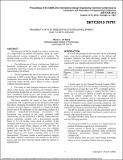Feasibility of a 5x Speedup in System Development due to META Design
Author(s)
de Weck, Olivier L
Download1105_1.pdf (2.012Mb)
PUBLISHER_POLICY
Publisher Policy
Article is made available in accordance with the publisher's policy and may be subject to US copyright law. Please refer to the publisher's site for terms of use.
Terms of use
Metadata
Show full item recordAbstract
The main goal of META design is to achieve a factor five (5x) improvement in product development speed for cyber-electro-physical systems compared to current practice. The method claims to achieve this speedup by a combination of three main mechanisms: 1. The deliberate use of layers of abstraction. High-level functional requirements are used to explore architectures immediately rather than waiting for downstream level 2,3,4 â requirements to be defined. 2. The development and use of an extensive and trusted component (C2M2L) model library. Rather than designing all components from scratch, the META process allows importing component models directly from a library in order to quickly compose functional designs. 3. The ability to find emergent behaviors and problems ahead of time during virtual Verification and Validation (V & V) and generating designs that are correct-by-construction allows a more streamlined design process and avoids costly design iterations that often lead to expensive design changes. This paper quantifies the impact of these main META mechanisms with a sophisticated System Dynamics (SD) model that allows simulating development projects over time. META compares favorably against a simulation of a traditional design process due to the generation of late engineering changes in a traditional design-build-Test-redesign environment. The benchmark case analyzed in this paper contained 3,000 requirements, and the results show a dramatic improvement for project completion schedule with a demonstrated speedup factor of 4.4 (70 months versus about 16 months). In the simulated META process we used 3 layers of abstraction, 50% novelty and a model library integrity of 80% with 70% of problems are caught early. The results were also validated against data from the B777 Electric Power System (EPS) design project at UTC where a speedup factor of 3.8 was demonstrated. The paper contains a useful sensitivity analysis that helps establish requirements and bounds on the META process and tool-chain itself that should enable the desired 5x speedup factor.
Date issued
2012-08Department
Massachusetts Institute of Technology. Department of Aeronautics and Astronautics; Massachusetts Institute of Technology. Institute for Data, Systems, and SocietyJournal
Volume 2: 32nd Computers and Information in Engineering Conference, Parts A and B
Publisher
ASME International
Citation
De Weck, Olivier L. “Feasibility of a 5x Speedup in System Development Due to META Design.” Volume 2: 32nd Computers and Information in Engineering Conference, Parts A and B (August 12, 2012).
Version: Final published version
ISBN
978-0-7918-4501-1